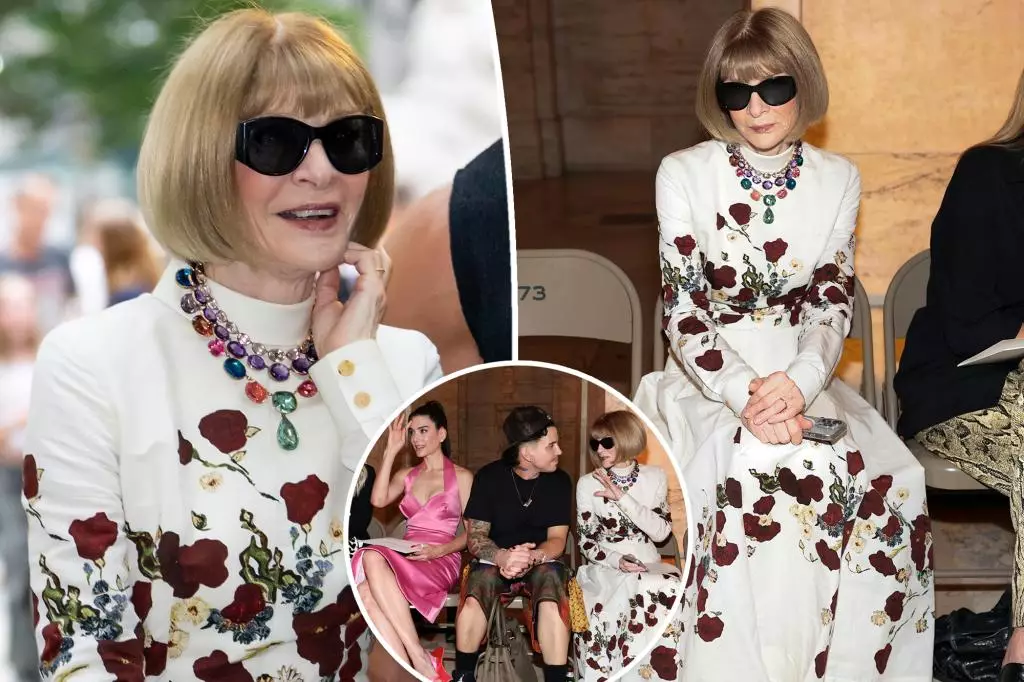Anna Wintour’s departure from her role as Vogue’s editor-in-chief marks not just the end of an era but the dawn of a new chapter in fashion history. Having wielded her influence for nearly four decades, Wintour has become synonymous with the very fabric of modern fashion journalism. Her decision to step back signifies a recognition of the evolving media landscape, but it also raises questions about who will carry the torch forward. Her impact extends beyond the glossy pages of Vogue; she transformed fashion into a cultural phenomenon, shaping trends and mentoring an entire generation of industry insiders. While some critics may see her stepping down as a loss, it’s more accurately a strategic repositioning—one that preserves her legacy while allowing fresh voices to emerge.
Her recent public appearance at Marc Jacobs’ fall 2025 show symbolizes her remaining influence and connection to the creative core of fashion. Wintour’s appearance, dressed with her trademark style—vibrant necklaces and sunny sandals—reminded us that her aura remains vibrant and commanding. Even in transition, she radiates an undeniable presence, one that can’t simply be diminished by a title change. Her choice to appear at such a pivotal event underscores her continued importance as a tastemaker and industry veteran whose opinions continue to resonate.
The Future of Vogue and the End of an Editorial Era
The mantle of editor-in-chief is a coveted seat, and Vogue’s announcement hints at a carefully curated succession plan. The role now involves managing the magazine’s multifaceted operations, but it also signals a broader shift—possibly towards a more digitally integrated approach. Wintour’s retention as chief content officer and global editorial director suggests she remains a guiding force, albeit in a different capacity. Her declaration that she will continue to focus on key cultural events like the Met Ball and Vogue World reveals her enduring passion and commitment. It seems she’s not retreating into the shadows but reorienting her influence to foster innovation within the Vogue universe.
This transition raises a critical point about the nature of leadership in fashion media today. Wintour has been the embodiment of authoritative editorial vision, yet her legacy also prompts industry insiders to consider whether future leaders will embody her blend of sharpness and artistry. The next generation’s challenge will be to balance tradition with innovation—something Wintour has mastered for decades. Her mentorship, reflected in high-profile projects like the collaboration with Marc Jacobs, has already set a precedent: that fashion is as much about fostering new perspectives as it is about honoring legacy.
Wintour’s Enduring Influence and the Road Ahead
What’s particularly compelling about Wintour’s exit is her ability to remain relevant amid change. Her strategic involvement in campaigns like Jacobs’ role as Vogue’s guest editor exemplifies her forward-thinking approach. She recognizes that the future of fashion is rooted in collaboration and reinvention, not stagnation. Her public appearances, her advocacy for cultural and political engagement, and her mentorship all illustrate her understanding that influence in this space is dynamic.
It’s clear that Wintour’s departure is less a goodbye than a transition—one where her experience and expertise will continue to shape the industry behind the scenes. As fashion continues its rapid evolution, her footprint will remain indelible, a testament to her visionary leadership. While her role in day-to-day editorial decisions may diminish, her influence will undoubtedly permeate future generations of designers, editors, and trendsetters. Wintour has left a legacy that challenges her successors to uphold her standards while boldly charting their own paths.

